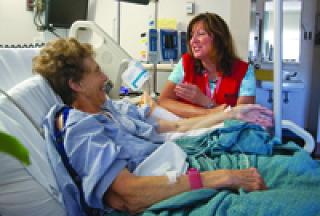Author: Mark Supiano, MD
The Hospital Elder Life Program (HELP) at University of Utah Hospital was recently named a HELP Center of Excellence and was cited as “playing a critical role in dissemination of the HELP model and serving as role models for interested programs providing mentorship of new sites.”
Mark Supiano, MD, director of the University of Utah Center on Aging and Medical Director for the HELP Program, details the success of the program. “We have been recognized as providing a quantitatively healthier and safer environment for our most vulnerable patients,” he said.
As one of only six national Centers of Excellence, the University’s program will act as a model for existing and new HELP sites. Part of these responsibilities will include hosting site visits and taking part in a formal annual credentialing process.
Originally developed by Dr. Sharon Inouye, the HELP program is an innovative approach to improving hospital care for older patients.
Primary goals of the program are:
- Maintaining cognitive and physical functioning of high risk older adults throughout hospitalization
- Maximizing independence at discharge
- Assisting with the transition from hospital to home
- Preventing unplanned hospital readmissions
Once a patient is enrolled in the program, trained volunteers visit as many as three times per day, for up to an hour per visit. The volunteers offer blankets, hearing aids or anything that might make the patient more comfortable. They also encourage proper nutrition and hydration. A key part of the visit is simply time spent talking.
HELP has just one goal: preventing delirium in patients. Patients with delirium have longer hospital stays, are at a greater risk for falls, and require a high level of supervision. Caused by a variety of factors including medications, difficulty with hearing and vision, dehydration, and poor sleep, delirium is relatively common in older hospital patients. Most importantly, it can be prevented by managing these risks. Among the nearly 400 UHC inpatients enrolled in HELP last year, the rate of developing delirium was a remarkably low 5%. As a Center of Excellence for HELP, the UHC will be able to disseminate its success to other sites.
